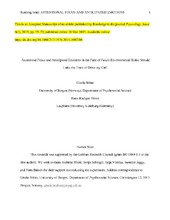| dc.description.abstract | This study presents an experiment investigating the effects of attentional focus and valence of experience on anticipated emotions and on intentions to drive by car or to use public transportation. Car driving is associated with being detrimental for the environment, whereas using public transportation is assumed to be environmentally beneficial. We regard environmentally friendly behaviour as an instantiation of a problem-focused coping strategy that is triggered by anticipated threat from an environmental stressor and aims at reducing the environmental problem. A discrepancy, however, may exist between the immediate experience of driving a car or using public transport, and the long-term experience of the consequences, that is, a polluted versus a healthy environment. Employing multimedia scenarios, we manipulated participants’ attention to focus either on behaviour (car or public transport) or on the environmental consequences, and induced either a positively or a negatively valenced experience. We measured anticipated emotions and intentions to use the car or public transport, and repeated the measurements two weeks later. Most important, a focus on consequences turns out to have stronger effects on emotions than a focus on behaviour. Also, intentions to use a car or public transport change when focusing on the future consequences, but not when focusing on the positive or negative circumstances accompanying the behaviours. A mediation analysis shows that while focusing on the consequences influences both anticipated emotions and behavioural intentions, the effect of focus on behavioural intentions is not mediated by anticipated emotions. Results suggest that emphasizing the long-term consequences of one’s behaviour is a better means of fostering pro-environmental behaviour than emphasizing the experience of the behaviours per se. | en_US |
